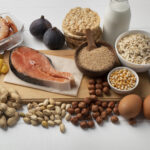
The Benefits of Digestive Enzymes for Optimal Nutrient Absorption
Digestive enzymes are nature’s microscopic heroes, breaking down food into nutrients your body can absorb. Whether you’re aiming to boost energy, improve gut health, or enhance muscle recovery, digestive enzymes play a critical role in ensuring your body gets what it needs to thrive.
How Digestive Enzymes Work
Core Function : Enzymes act as catalysts, speeding up chemical reactions that digest macronutrients (proteins, fats, carbs) into smaller molecules like amino acids, fatty acids, and simple sugars .

Key Enzymes :
- Protease : Breaks down proteins.
- Lipase : Digests fats.
- Amylase : Processes carbohydrates.
Why This Matters: Without sufficient enzymes, nutrients remain locked in food, leading to malabsorption and deficiencies.
Top Benefits for Nutrient Absorption
3.1 Enhanced Bioavailability of Vitamins & Minerals
Digestive enzymes ensure vitamins (A, D, E, and K), minerals (calcium, magnesium), and amino acids are released efficiently. For example, lipase improves fat breakdown, boosting absorption of fat-soluble vitamins
3.2 Reduced Food Intolerance & Bloating
Enzymes like lactase (for dairy) and alpha-galactosidase (for beans) help digest problematic foods. This reduces bloating, gas, and discomfort—common signs of poor nutrient absorption.

3.3 Improved Protein Utilization
Protease enzymes convert proteins into amino acids, the building blocks of muscle and tissue repair. This is vital for athletes or those recovering from illness.
3.4 Support for Gut Health
By reducing undigested food waste, enzymes lower gut inflammation and promote a balanced microbiome. A healthy gut absorbs nutrients 20% more efficiently.
3.5 Energy Efficiency
Enzymes ensure your body extracts maximum energy from food. For instance, amylase converts carbs into glucose, your primary energy source
Who Needs Digestive Enzymes?
- Adults with Low Enzyme Production : Aging or pancreas issues reduce natural enzyme output.
- Vegetarians/Vegans : Plant-based diets require extra enzymes to break down complex carbs and proteins
- Travelers : Combat digestive stress from unfamiliar foods or jet lag.
Natural Sources vs. Supplements
Natural Sources :
- Pineapple (bromelain, a natural protease).
- Papaya (papain breaks down proteins).
- Fermented foods (kimchi, yogurt) contain probiotics and enzymes
Supplements :
- Pancreatic Enzyme Supplements : For those with deficiencies (e.g., cystic fibrosis).
- Broad-Spectrum Enzymes : For general digestion and nutrient absorption support
How to Choose the Right Supplement
Look for :
- Targeted Enzymes : Lipase for fat digestion and amylase for carbs.
- Potency : Measured in units (e.g., 5,000 FCC units of protease).
- Plant-Based Options : For vegetarians and vegans (e.g., fungal-derived enzymes)
FAQ: Common Queries About Digestive Enzymes
Q: Do digestive enzymes help with weight loss?
A: Yes, indirectly. By improving nutrient absorption, they reduce cravings for empty calories.
Q: Can they reduce symptoms of lactose intolerance?
A: Absolutely! Lactase supplements break down lactose, easing bloating and discomfort.
Q: Are there risks of over-supplementation?
A: Rare, but excess lipase may cause diarrhea. Always follow dosage guidelines.
Q: How do enzymes boost immunity?
A: By reducing gut inflammation and improving absorption of immune-boosting vitamins like C and D.
Final Recommendations
- Pair with a Balanced Diet : Enzymes work best with nutrient-rich foods.
- Consult a healthcare provider: For deficiencies or chronic conditions like IBS
Transform Your Digestion Today
Explore enzyme supplements or add enzyme-rich foods to your diet; your body will thank you!




